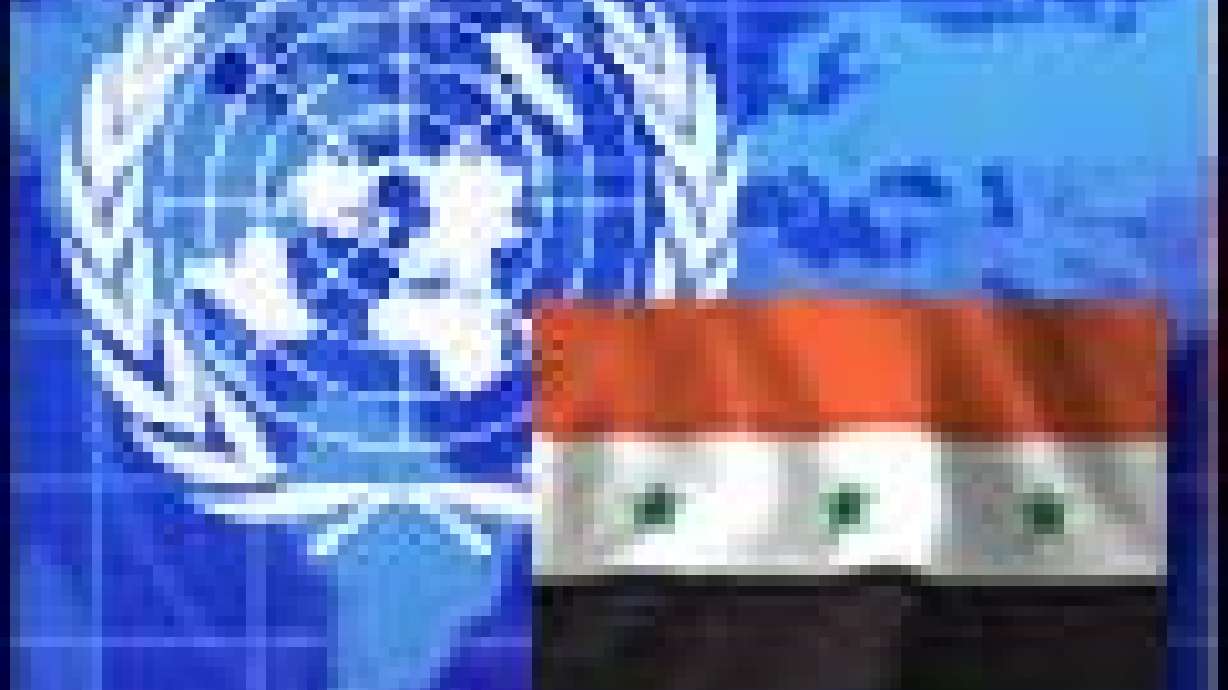Estimated read time: 4-5 minutes
This archived news story is available only for your personal, non-commercial use. Information in the story may be outdated or superseded by additional information. Reading or replaying the story in its archived form does not constitute a republication of the story.
UNITED NATIONS - The United States will introduce a resolution Friday calling for the United Nations to lift sanctions against Iraq immediately and phase out the oil-for-food aid program over four months, diplomats said. But the proposal already faces opposition from Russia and France.
U.S. Ambassador John Negroponte asked the Security Council to schedule consultations Friday morning to circulate the U.S. draft. Washington has started circulating key elements to the 15 council members, and several have received the full text. U.S. officials were also delivering the resolution to council capitals, the diplomats said Thursday.
The resolution would also create an international advisory board — including U.N. Secretary-General Kofi Annan (news - web sites), the World Bank and the International Monetary Fund — to audit how income from Iraq's oil industry is spent and ensure it is used to benefit the Iraqi people, the council diplomats said, speaking on condition of anonymity.
In addition, Annan will be asked to appoint a special coordinator for Iraq to be based in Baghdad who would oversee U.N. involvement in humanitarian relief, reconstruction, and formation of a democratic government, the diplomats said.
Speculation on possible coordinators was intense and included Sergio Vieira de Mello, the U.N. High Commissioner for Human Rights.
U.S. President George W. Bush, meanwhile, ordered U.S. sanctions against Iraq lifted Wednesday, allowing U.S. humanitarian aid and remittances to flow into Iraq.
U.S. Secretary of State Colin Powell, calling for an end to the diplomatic battles that erupted before the war, said the new resolution "will unite the international community ... (and) help the people of Iraq to a better life and to build a government."
But France and Russia oppose the immediate lifting of oil and trade sanctions and have made rival proposals.
The United States could also face opposition from council members that want the world body to be a major player in creating an interim government for Iraq. U.S. officials have insisted that the coalition that ousted Saddam Hussein must retain the lead.
Russia's Deputy Foreign Minister Yuri Fedotov has said that Moscow wants only a suspension of the embargoes on food and medicine — suggesting that a new confrontation may be in the works.
Russia has circulated a draft resolution calling for Annan to run the oil-for-food program, taking charge of Iraq's petroleum sales and development of its oil fields until an internationally recognized Iraqi government comes to power.
Phasing out the oil-for-food program over four months — as the United States wants — would end U.N. control over Iraq's oil revenues, which have been deposited in a U.N.-controlled escrow account. The United States wants to use that money to pay for Iraq's reconstruction.
U.N. humanitarian programs operating under the oil-for-food program would end as well, though U.N. officials are setting up new aid programs in Iraq. The program fed up to 90 percent of Iraq's 24 million people before the war.
Russia and France, which both had lucrative contracts with Saddam Hussein's government under the oil-for-food program, have been in no hurry to end it.
Many council members have said they will try to find a consensus. But emotions are still raw from the dispute in which the United States, Britain and Spain backed invasion of Iraq, and France, Russia, Germany and China opposed it.
Powell and Bush both adopted a conciliatory tone Wednesday. After meeting Annan, Powell referred to Germany, France, Russia and China as "our friends."
In Washington, Bush insisted that "the mood that existed before the war has changed and people want to work together for the good of the Iraqi people."
Powell told the Foreign Policy Association's annual dinner Wednesday night that the U.S. resolution "can bring us all together to give the Iraqi people a better life and hope for a much brighter future." He received the association's medal along with Javier Solana, the European Union's security and foreign policy chief.
There were indications Germany would work with the United States.
"Let us not repeat the debates of yesterday and look forward and solve the problems that are at hand in the interests of the Iraqi people," said Germany's U.N. Ambassador Gunter Pleuger.
"The council is in a constructive and cooperative mood, and that is true for us, of course, too," he said.
France's U.S. Ambassador Jean-David Levitte said that "we want to find the best possible solutions in the interest of the Iraqi people."
Nonetheless, France's proposal calls on the council to suspend sanctions, phase out the oil-for-food program, have U.S. and U.N. weapons inspectors work together, and lift sanctions when a legitimate Iraqi government is in place.
Under council resolutions, U.N. inspectors must certify that Iraq's nuclear, chemical and biological weapons programs have been eliminated before sanctions can be lifted.
The United States has deployed its own inspection teams and doesn't want U.N. inspectors to return any time soon.
(Copyright 2003 by The Associated Press. All Rights Reserved.)








